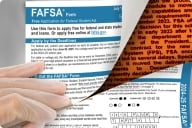You have /5 articles left.
Sign up for a free account or log in.
"Proles," explains Paul Fussell in his book Class, "like to use words that normally appear only in newspapers. They don't realize that no one calls the Pope the pontiff except in pretentious journalese, or a senator a lawmaker, or the United States the nation, or a scholar an educator . This last is not objected to by high-school teachers and administrators, who rather embrace it as an elevating professional euphemism. Thus it's purely for social class reasons that university professors object to being denominated educators, because the term fails to distinguish them from high-school superintendents, illiterate young teachers with temporary "credentials," and similar pedagogic riffraff. The next time you meet a distinguished university professor, especially one who fancies himself well-known nationally for his ideas and writings, tell him it's an honor to meet such a famous educator, and watch: first he will look down for a while, then up, but not at you, then away. And very soon he will detach himself from your company. He will be smiling all the time, but inside he will be in torment."
A sadder-but-wiser Duke University junior begins to perceive some of the deep structure behind Fussell's observation, as she describes (in the Duke Chronicle) her disappointment in her professors over the years.
"[I]n any given semester, everyone I talk to seems to have one or two awesome teachers, and the rest are mediocre at best.
You know the type. They do the absolute bare minimum required to constitute the label of professor. They read off slides filled with notes straight from the readings, they make every class exactly the same, and they don't engage the students in any way....
To professors: ... Take a look around your classroom. If half the students only show up on test days, and if the half who are actually there are either typing on their laptops [Please note: This student makes clear what we all know. For almost all of your students, the very act of typing on a laptop means they're not paying attention to you.] or reading this column in The Chronicle, you might want to rethink your methods."
The student now clarifies the high school teacher / university professor distinction about which Fussell writes:
"Teachers in high school are generally there because they love to teach. Professors in college are generally there because they love their particular subject. While this means the professor may be an expert in their field, they may not realize that students don't share their enthusiasm for the subject.
...Be bold. Shake things up.... You have been given some of the brightest minds in the country. Excite them! Make them love the subjects you are obviously passionate about yourselves.
... In the words of William Ward, 'The mediocre teacher tells, the good teacher explains. The superior teacher demonstrates, the great teacher inspires.' ..."
My friends (I've been listening to John McCain speeches), if you can inspire students by straddling a podium and giving head to PowerPoint slides, you are some kinda genius... This Duke student has come to perceive some of the contours of the rip-off she's experiencing (she mentions her almost fifty thousand dollar a year tuition prominently in the piece), but there's more to say.
Class snobs, and the research-obsessed, greet laptops and PowerPoint with unalloyed delight. These technologies make their retreat from the classroom complete, yet in a way that mindlessly pro-technology administrators on their campus consider laudable.
The cynical epitome of the cynical PowerPointer's life occurs when he or she gets research money to study ways of increasingthe classroom use of this technology. Burnishing your research credentials; perfecting your emotional and intellectual removal from the classroom. Voila.





